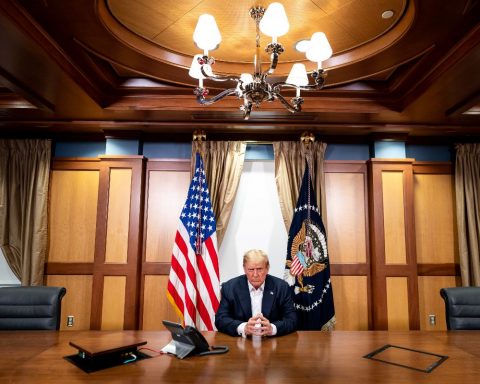TBILISI — On a recent Sunday, two dozen political activists, lawyers, and investigative journalists gathered beside Lake Bateti, a beautiful expanse of turquoise water in the heart of the mountainous nation of Georgia.
They had left Russia facing harassment and possible prison time for their work. Now, shaded by evergreen conifers reflected in the lake’s surface, many sought community among other exiles and forged ties that would help acclimatize them to an unplanned life abroad.
“We sat down by the water, lit a fire, and got to know each other,” said one of the participants, Maria Kuznetsova, who arrived in Tbilisi over the summer fearing retaliation for her involvement in the banned opposition group Open Russia.

A sweeping crackdown launched by Russia’s government since the January jailing of Kremlin foe Aleksei Navalny has prompted hundreds of opposition activists to flee the country seeking refuge in neighboring ex-Soviet states with Russian-speaking minorities and foreign policies critical of Moscow.
Some have settled in Ukraine and the Baltic states, others further west. But about 300 activists, according to unofficial estimates, have arrived in Georgia, a country whose low cost of living and lenient immigration laws make it one of few easily accessible destinations in pandemic times.
In Tbilisi, the Georgian capital and a city of 1.1 million people, many Russian exiles say they have begun cultivating the sort of solidarity and collaborative spirit that seemed impossible in Moscow, a vast metropolis where the opposition movement has long struggled to come together as a unified force against the authoritarian government of President Vladimir Putin.
“There’s a sense that a major political event may happen in Russia in the next few years, and we have to be ready for it,” said Yaroslav Konvei, the 23-year-old head of Russia’s Libertarian Party who fled as authorities began targeting its members. “The goal of those who have left — the journalists, activists, lawyers — is to prepare civil-society structures able to capitalize on such a moment.”
‘Putin Exodus’
A century ago, more than 220 prominent intellectuals were forcibly exiled from Russia just weeks before the official establishment of the Soviet Union in December 1922, packed into so-called “philosophers’ ships” that transported them to Germany and other European states. The authorities continued expelling dissidents in the decades that followed. The Russian opposition today talks of a “Putin exodus” — the mass emigration of educated citizens that accelerated after Putin, who has been in power since 2000, returned for a third presidential term in 2012.
“Today we leave not on ships, but on planes,” quipped lawyer Ivan Pavlov, who left Russia in early September after he became the target of a criminal investigation for disclosing details of a treason case against a Russian journalist.

But the difference today, he and fellow exiles contend, is that Putin’s government rarely forces its opponents out of the country. Instead, it allows them to leave of their own accord, choosing emigration over further house raids, jail, or worse. Activists who flee argue that they can achieve more in exile than under siege or behind bars.
After searching Pavlov’s St. Petersburg apartment in April, investigators confiscated various items but left his passport lying on a desk in his office. Official documents listing the charges against him stipulated no restrictions on his movement. The message, he figured, was simple: Here’s your chance to leave.
“Having too many political prisoners is not good for the state. There’ll be too much international pressure to release them,” said Pavlov, who was trailed to St. Petersburg airport by two unidentified men who recorded his movements but made no effort to stop him. “In Soviet times, they actively pushed people out. But this way is economically and politically more advantageous for them.”

Anton Mikhalchuk, a former Open Russia coordinator who left for Georgia in 2019 after being targeted for working with an organization deemed “undesirable” in Russia, said the state’s ultimate goal is to “exclude people from the system.” For the government, he said, placing them behind bars is the least preferable route to achieving that goal.
“The main aim is to destroy organizations, and to remove anyone capable of occupying a leadership position,” he said. “When such a person leaves Russia, he effectively ceases being a threat. He can write a post or record a video, and so what? The main danger for the state is street protest. A person who has left Russia can’t effectively do that.”
Many observers, for example, believe that the Kremlin wanted Navalny to remain abroad after several months recovering in Germany from a near-fatal nerve-agent poisoning he blames on Putin. When he nevertheless returned to Russia in January, he was arrested before even passing through customs, and now languishes in prison.
Those who take the state’s cues — who are driven to the point of abandoning their homes and sometimes their families in a country they worked for years to change through political activism and protest — often arrive in Georgia needing not only assistance in finding jobs and accommodation, but urgent psychological help, according to Mikhalchuk.
‘Pretty Terrifying’
The former opposition coordinator, who now helps new arrivals in Georgia as an employee of the NGO Free Russia Foundation, says many come after having spent months fleeing from law enforcement in Russia, and they walk the streets of Tbilisi jittery and extremely distrustful, seeing in every Georgian policeman a potential enemy.
“It’s a pretty terrifying thing when you run up against the state machinery tasked with essentially destroying you, depriving you of the means to live, pressuring you and raiding your home and the homes of your relatives and friends,” he said. “It’s an enormous amount of stress, it breaks people. And they arrive in Georgia broken.”
And even outside Russia, anti-Kremlin activists can come face to face with that state machinery. Interpol officers sometimes stop activists at major international airports, and Russian state TV crews visit Tbilisi for propaganda reports portraying the exile community as Western stooges. Kuznetsova said a reporter who recently tried to elicit information from Russian dissidents in a Tbilisi bar locked herself in the bathroom after the barman threatened to call the police.

Exiles interviewed by RFE/RL in Georgia, several of whom spoke on condition of anonymity because they feared the consequences of going public about their emigration, said they had not encountered any hostility from the local population, though many noted struggles to find work and a sense of purpose in a country where speaking Georgian is a necessary requirement for employment.
Some also echoed fears voiced by Georgian opposition politicians who contend that the Georgian government is increasingly susceptible to influence from Moscow, which banned direct flights to Georgia amid rising tensions in June 2019.
Violent mob attacks on LGBT activists in July, a massive surveillance-tape leak, and the arrest earlier this month of former Georgian President Mikheil Saakashvili have furthermore fueled claims by critics of a democratic backslide in a country with high popular support for integration with the European Union and NATO.

“If Putin wanted to, he could push Georgia to extradite those people,” Giorgi Kandelaki, an opposition member of the Georgian parliament, told RFE/RL, referring to Russian political exiles. “Georgia should be helping them. But for this government, they’re uncomfortable guests.”
Political Risks
The Georgian Foreign Ministry did not answer requests for comment. Ghia Nodia, a former education minister who now works a political analyst, said Georgia’s authorities prefer to stay quiet and ignore the presence of Russian dissidents, since publicly condemning or backing them carries political risks.
“They don’t want to annoy the Russian government in any way,” Nodia told RFE/RL. “But they also don’t want to be seen as hostile to people of a democratic persuasion.”
This approach may make Georgia a safer destination than other countries. A one-year visa free regime and cheap monthly rent affords many arrivals the space to recharge and reflect. But for some, Georgia is merely a stopover en route to EU member states that offer greater professional and educational opportunities but have shut borders to many foreigners due to the ongoing pandemic.
Among the dissidents in Tbilisi, there was hope that the Kremlin’s relentless crackdown on opposition would let up after last month’s parliamentary elections, in which government critics were barred from running and the pro-Putin United Russia party held onto its constitutional majority amid widespread allegations of fraud.
“If conditions change in Russia, and I know I can safely do my work, then I’ll return on the first available flight,” said Pavlov, the lawyer.
But law enforcement has continued to raid the homes of activists throughout the country, and the authorities are designating a growing number of individuals as “foreign agents” and singling them out as enemies of the state.
Against this backdrop, there has been little let-up in the exodus to Georgia and beyond.
“It’s great to not have to wake up at 5:50 a.m. to answer a knock on the door. It’s easier to breathe here,” said Konvei. “But many of us initially thought we’d sit here till the end of the election period. Now I understand we’ll probably sit here till the end of Putin.”






